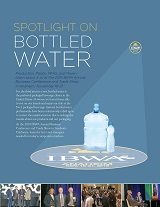Alexandria, VA — Commemoration of Earth Day 2011, celebrated on April 22, includes good news for those concerned about recycling empty plastic water bottles. PET plastic bottled water containers are again the single most recycled item in nationwide curbside collection programs, and their recycled rate has grown to 31%. According to International Bottled Water Association (IBWA) President and CEO Joe Doss: “We are really proud to have expanded bottled water’s PET plastic recycling leadership position, and want to recognize the millions of thoughtful bottled water consumers for taking an extra second or two to put their empty plastic bottles in the recycle bin.”
This positive news about PET plastic bottle recycling on Earth Day 2011 comes from the National Association for PET Container Resources (NAPCOR), which completed a major bale study last year in 15 locations in 14 states. The 31% recycling rate is up only slightly since last year, which was 30.9% but a welcome continuation of steady annual increases in the recycling trend line since this analysis commenced in 2004, when the recycling rate for PET plastic bottled water containers stood at 16.62%. The latest data indicates that the recycling rate for PET plastic bottled water containers has nearly doubled in six years.
As for making the plastic bottles lighter, analysis performed by the Beverage Marketing Corporation (BMC) for IBWA shows that over the past eight years the gram weight of the 16.9 ounce “single serve” bottled water container has dropped by 32.6%. The average PET bottled water container weighed 18.9 grams in 2000 and by 2009, the average amount of PET resin in each bottle has declined to 12.7 grams. In keeping with this year’s Earth Day theme of “A Billion Acts of Green,” BMC estimated that during this time span, more than 1.3 billion pounds of PET resin has been saved by the bottled water industry through container light-weighting. In 2008 alone, the bottled water industry saved 445 million pounds of PET plastic by reducing the weight of its plastic bottles.
Improved recycling rates and lighter-weight containers are only part of the good news that the bottled water industry includes in its Earth Day 2011 commemoration. Last year, IBWA commissioned a Life Cycle Inventory (LCI) study to determine the environmental footprint of the United States bottled water industry. The results indicate that bottled water has a very small environmental footprint. The study found:
- Measurement based on British Thermal Units (BTUs) indicates that the energy consumed to produce small pack water bottled water containers (containers from 8 ounces to 2.5 gallons) amounted to only 0.067 percent of the total energy use in the United States in 2007. Home and Office Delivery (HOD) bottled water (reusable bottles from 2.5 to 5 gallons) energy consumption only amounted to 0.003 percent of the total energy used in the United States in 2007.
- The small pack and HOD bottled water industries’ combined greenhouse gas/ CO2 emissions amounted to only 0.08 percent of total United States greenhouse gas emissions.
- Bottled water packaging discards accounted for only 0.64 percent of the 169 million tons of total U.S. Municipal Solid Waste (MSW) discards in 2007.
- The process and transportation BTU energy use for the bottled water industry was only 0.07 percent of total U.S. BTU primary energy consumption.
- Greenhouse gas emissions per half gallon of single serve bottled water came to 426.4 grams CO2 equivalent (eq.), which is 75 percent less CO2 eq. per half gallon than orange juice.
- Small pack bottled water generates 46 percent less CO2 eq. when compared to soft drinks also packaged in PET plastic.
Franklin Associates, a division of ERG, produced the LCI and prepared a report that quantified the energy requirements, solid waste generation, and greenhouse gas emissions for the production, packaging, transport, and end-of- life management for bottled water consumed in the United States using final data from calendar year 2007.
The environmentally aware actions of many bottled water companies, such as the use of more recycled PET (rPET) in their bottle production, have positively impacted the environmental footprint of the industry and are expected to lower the bottled water industry’s environmental footprint even more in the years ahead.
The bottled water industry’s momentum toward more recycling and container lightweighting “can be seen as quickly going in the right direction,” says Joe Doss. “These are clear signs of improvement but far more needs to be done with all plastic products and containers,” he said. “Empty water bottles comprise only 1/3 of 1% of the U.S. waste stream according to the U.S. Environmental Protection Agency. So even if bottled water containers were to hit a 100% recycle rate, there would still be far too many plastic containers of all kinds in the landfills unless more is done on all fronts. Let’s hope Earth Day 2011 inspires a more comprehensive approach to product recycling then merely focusing solely on one industry.”



























